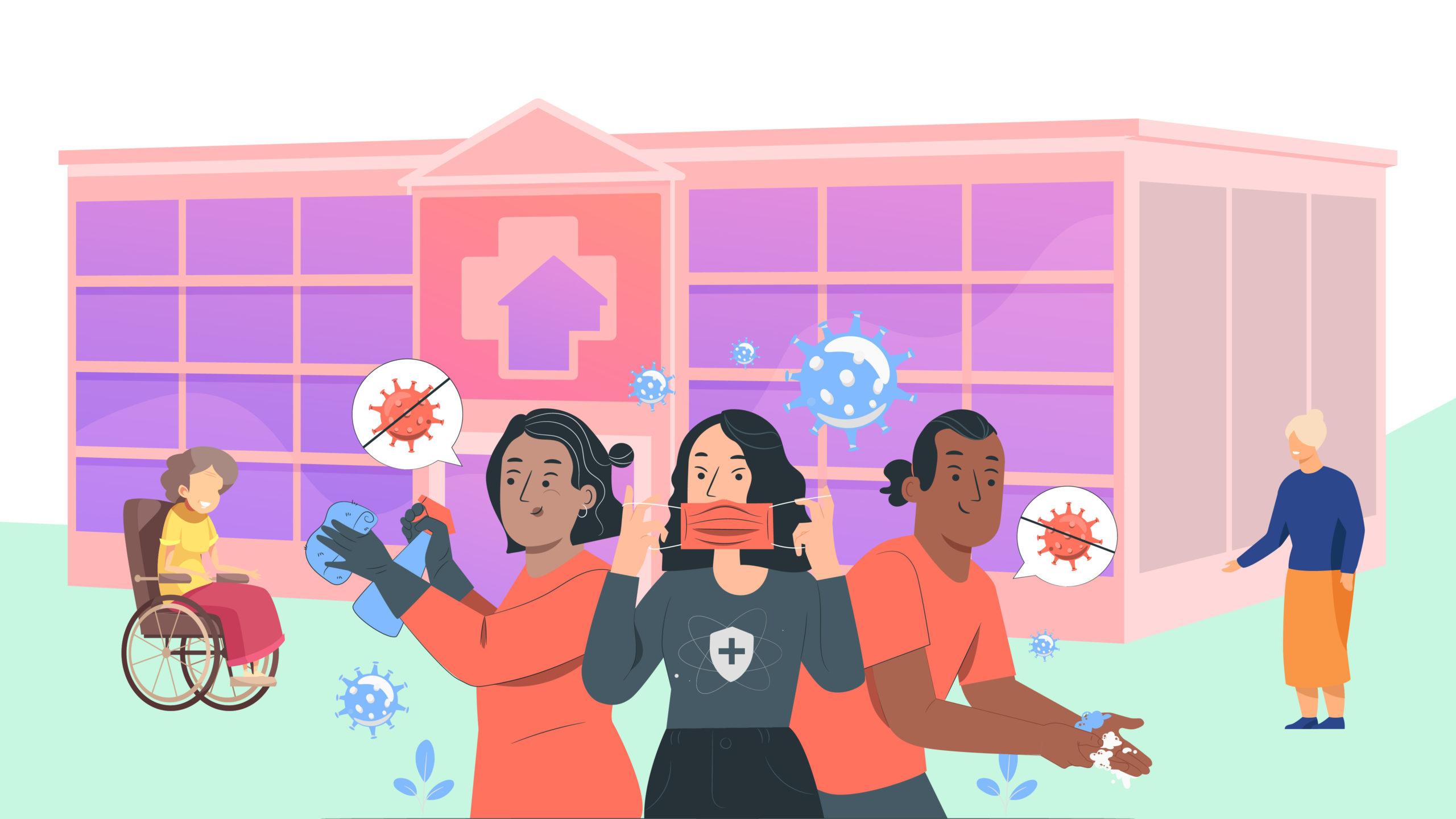Article Contents
Introduction
It’s hard to turn on the news or go online without hearing about the coronavirus. It is helpful to become educated on what the coronavirus is, including symptoms. But it is equally important to avoid panicking and misinterpreting information. Continue reading below to learn more about Covid-19 in Seniors.
What Is Coronavirus?
Coronaviruses are a type of virus that can cause a respiratory infection, such as the common cold, or more serious diseases such as SARS. These viruses are typically spread through the air, and can cause severe respiratory illness in humans. A newly identified coronavirus, SARS-CoV-2, has caused a worldwide pandemic of respiratory illness, called COVID-19.
The coronavirus or COVID-19 was first identified in Wuhan, China, and was linked to a live animal market. But the virus has spread to several other countries, including the United States.
Initially, cases in the U.S. were linked to travel to China. But it appears there is now community spread of the virus, which means some people are infected, and it is not always clear where or how they became infected.
What Are the Symptoms of Covid-19 in Seniors?
Symptoms of COVID-19 include:
- Cough
- Shortness of breath
- Fever
Some of the symptoms of COVID-19 are similar to the flu. But there are a few differences. In addition to the symptoms above, the flu may also cause symptoms, including:
- Sore throat
- Fatigue
- Stuff nose
- Muscle aches
How Is Covid-19 in Seniors Spread?
According to the Centers for Disease Control and Prevention, COVID-19 appears to be spread from person to person. It is spread through breathing in respiratory droplets from a cough or sneeze from someone infected. Also, it is possible to contract the virus by touching a surface that was contaminated with the virus. It is still not clear how long the COVID-19 may live on surfaces, but it is thought it may survive a week. Many people have no choice but to self-isolate at home.
Who Is Most at Risk of Severe Disease?
Information about the impact of the virus is still evolving. But according to the CDC, older adults are at an increased risk of complications from COVID-19, including respiratory failure. Additionally, people with underlying medical conditions, such as chronic obstructive pulmonary disease, heart disease, and diabetes, are also at an increased risk of severe disease.
Individuals that are older and also have the underlying medical condition may need to take additional precautions, such as avoiding non-essential air travel and staying away from crowds.
Covid 19 Vaccination for Seniors
Seniors are some of the most vulnerable members of our society when it comes to Covid 19. They are more likely to experience severe symptoms and complications from the virus, and they are also more likely to die from it. That’s why it’s so important for seniors to get vaccinated against Covid 19 as soon as possible. According to CDC, adults aged 65 years or older who were fully vaccinated with an mRNA COVID-19 vaccine (Pfizer-BioNTech and Moderna) had 94% reduced risk of hospitalizations due to this virus.
The Covid 19 vaccination is given in two doses, usually four weeks apart. A third booster shot is given to maintain immunity against the virus. Covid 19 boosters for seniors will help keep them protected in the future as new variants of the virus continue to emerge.
Dos and Don’ts to PreventCovid-19 in Seniors

There are several things you can do to decrease your risk of contracting the virus. Consider the following dos and don’ts:
Dos:
- Wash your hands often using soap and water for at least 20 seconds.
- Disinfect frequently touched surfaces, such as door handles and countertops
- Avoid touching your mouth, nose, and eyes as much as possible.
- Pay attention to travel advisories and avoid going to places outside the United States that are hard hit by the virus.
Don’ts:
- Close contact with people that are sick.
- Go out if you are sick.
- Attend crowded events if you are at a high risk of complications from the virus
- Don’t panic. A common-sense approach to preventing the virus is your best bet.
Keep in mind: most people recover from the coronavirus, but it can be serious in vulnerable populations, which is why it is essential to take precautions, such as above.
Conclusion
Older adults with underlying health conditions are at an increased risk of severe COVID-19 complications. Vaccination is the best way to protect yourself and those around you from this virus. There are risks associated with any medical procedure, but the risks of not getting vaccinated are far greater.
If you would like more helpful information on ways to stay fit and healthy, please check out our other articles on Health & Fitness.
Frequently Asked Questions
Which covid vaccine is better for seniors?
There is no one-size-fits-all answer to this question. However, Pfizer and Moderna vaccines have proven effective in preventing COVID-related hospitalizations or deaths due; they are also safe.
Can senior citizens travel by train during covid?
Yes, senior citizens can travel by train during covid. However, they should take some precautions to protect themselves from the virus. These precautions include wearing masks, avoiding close contact with others, keeping their distance from people who are sick, and washing hands frequently. If they feel sick, they should stay home and seek medical help.
Can seniors get Covid vaccine in Florida?
Yes. Older adults, aged 65 years and older are eligible to get Covid vaccine in Florida.
What are the first signs of covid 19 in seniors?
The first signs of Covid 19 in seniors include: fatigue, sore throat, coughing, and body aches. They might also show some unusual symptoms such as feeling confused and disoriented, falling or feeling dizzy, etc.

